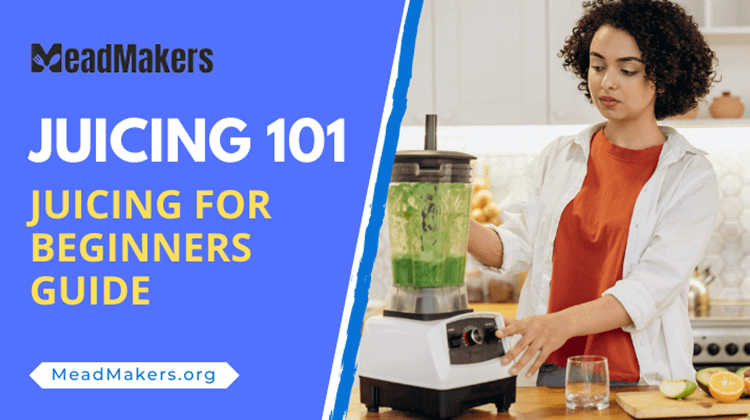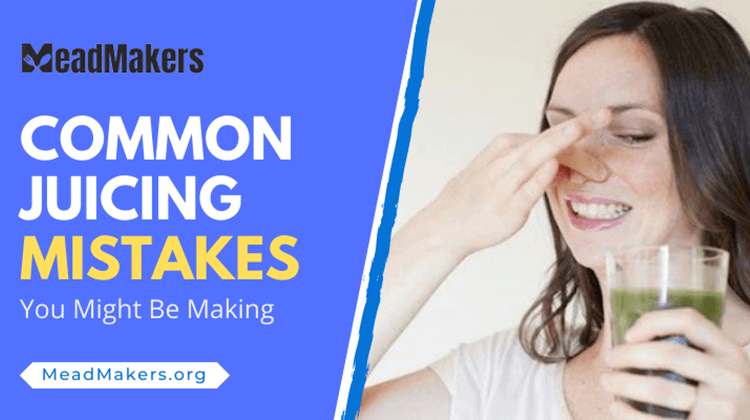Juicing 101: Juicing for Beginners Guide
Congratulations on making the decision to add juicing into your diet and start living a healthier lifestyle. This juicing 101 guide will discuss everything you need to know about juicing for beginners.
What is juicing?
Juicing is the practice of passing fresh fruits and vegetables through a juicer that pulverizes or crushes them before extracting the juice.
The amount of vitamins, minerals, and enzymes in your juice depends on the juicer you use. Fresh juice always tastes better and has more nutrients than bottled juices purchased at a shop.
It boasts a slew of life-changing health benefits, including improving your immune system and lowering your risk of cancer and heart disease.
When you could just eat raw fruits and veggies, why drink juice?
Juicing allows you to eat a wider variety of foods. Consider this: you would most likely feel queasy if you ate three to four cups of kale, three large carrots, one green apple, a couple of celery stalks, and a cup or two of spinach leaves.
Those same goods, on the other hand, can be juiced and eaten in one to two servings.
Isn’t it true that smoothies are better for you than juices?
The only difference between juicing and blending is the pulp content. Smoothies are great for getting insoluble fibers, but a glass of freshly squeezed juice is a great way to round out a meal with a nutritious drink.
Fibers in the form of soluble fibers are still available. Because soluble fiber absorbs water and changes into a gel-like material, it is beneficial to our system.
By binding the fatty acids together and slowing the digestion process, it lowers cholesterol and blood glucose levels.
Both are good for your health, and the best part is that you can do both simultaneously. To learn more about the distinctions between juicing and blending, see my article.
What is the best method for juicing?
Anyone can benefit from juicing in one of two ways: as a juice feast or a juice fast.
Juice Feast
Simply explained, a juice feast is when you serve a glass of healthy fresh juice with your usual meal. This raises your energy levels, strengthens your immune system, and helps you maintain a healthy weight by increasing your vitamin and antioxidant intake.
Antioxidants aid in the prevention and repair of oxidative damage in our bodies produced by free radicals. The health problems produced by free radicals include heart disease, cancer, diabetes, macular degeneration, and a plethora of other maladies.
Juice Fast
A juice fast (also known as a juice cleanse or juice detox) helps the body eliminate toxins and waste from the digestive system.
A 3-day, 5-day, 7-day, or 10-day juice cleanse is possible, but you should consult your doctor first because it is not recommended for pregnant women or diabetics.
The good news is that everyone may partake in juice feasting.
What do you need for juicing?
Before you can start juicing, you’ll need these four ingredients.
1. A Quality Juicer
The greatest juicer can handle a variety of ingredients, including soft fruits, hard vegetables, leafy greens, including wheatgrass, and it’s even better if it can make soy and almond milk.
This is something that cold press juicers can do. If you need help determining which juicer is right for you, check out my juicer buying guide.
2. Juicing Recipes
You can’t just throw together a bunch of stuff and expect it to taste delicious. This is when recipes can come in handy.
It’s also worth remembering that some foods juice better than others.
In the near future, I’ll compile juice recipes based on healing properties and ingredients, and I’m also working on a juicing app to make juicing even easier.
3. Storage
You’ll need a decent container to keep your juice fresh and tasty unless you plan on drinking it right soon.
Glass is the greatest alternative since it does not contain Bisphenol A (BPA), a dangerous chemical found in plastic.
For more information on your storage choices, read my post on how to preserve freshly squeezed juices.
Related: Is Your Juicer BPA-Free? How Does It Matter? Let’s Explore
4. Persistence & Motivation
Finally, in order to live a healthier lifestyle, you must be motivated and willing to make the necessary lifestyle modifications. Perseverance, patience, and self-discipline are required.
Discipline is the most important factor. You won’t always feel like removing everything, washing and juicing the veggies, and then cleaning up.
You could be tempted to revert to an old habit because you want to be lazy on that particular day, but believe me when I tell you it’s not worth it.
A single day can easily become a week or more. If you do not consume the nutrients that fresh juice delivers, you will surely feel lethargic and unmotivated.
I like feeling energized and well overall.
Useful Tips
- It’s better to peel your carrots; otherwise, they may provide an unpleasant flavor to your juice.
- Alternate between rougher and softer vegetables at all times.
- Remove the peelings from the citrus oranges and discard them.
- Cherries and other fruits and vegetables with large pits should be removed. Getting rid of the apple seeds is also a good idea.
- Cut your vegetables into smaller pieces to make them more manageable. Your juicer will thank you. Chop celery, carrots, and greens into tiny pieces to avoid overburdening the motor.
- To give fresh juices a kick, add spices like ginger, cardamom, pepper, parsley, and turmeric. They not only enhance the flavor of your drink but also provide health benefits.
- You can’t juice bananas or avocados, but you can incorporate them into your juice after you’ve finished juicing.
- Start your day with a glass of juice, and don’t forget to chew!
- Don’t overwork yourself if you’re fasting
- The taste of fresh juice versus bottled or canned juice will always be different.
FAQs
Should I seek medical advice before beginning to juice?
Before embarking on a new eating regimen, especially if you intend to fast, speak with your doctor. If you’re pregnant, breastfeeding, or have any other serious health issues, always be with your doctor before making any changes.
How much juice should I drink during the day?
It is entirely dependent on your objectives. If you’re fasting, drink around 24 ounces every couple of hours.
You can drink more if you like as long as you stick to predominantly green juices. During your fast, pay attention to your body and drink plenty of water.
Drink 10 to 24 ounces of water before each meal if you’re supplementing with food. This reduces the amount of food consumed during meals.
Start with two or three 10- to 16-ounce meals each day if you’re new to the program and nervous.
When should I drink my juice?
The best time to drink your juice is before a meal, on an empty stomach.
Is juicing merely a fad for weight loss?
Although juicing can help you lose weight, it is not a miracle cure. You’ll need to incorporate a fitness routine into your daily routine.
You begin to embrace a healthier lifestyle when you juice every day. You’ll become more conscious of your food choices and the amount of food you consume, and you’ll lose those unhealthy food cravings that many individuals experience, leading to weight gain and retention.
Juicing isn’t a fad because it leads to a healthier lifestyle, but you’ll have to work hard if you want to lose weight.
What fruits and vegetables should I avoid juicing?
Apple seeds, carrot tops, papaya peels, citrus (orange/grapefruit) rinds, and wild parsnips are not juiceable.
What’s the best way to get rid of pulp from my juice?
Using a strainer, separate the leftover pulp from the juice. If your juicer didn’t come with one, pick one up at your local market. It makes no difference which kind you use.
What exactly is the foamy material on the surface of my juice?
It’s merely liquid that’s been exposed to air and fluffed up. The more quickly you juice the fruits and vegetables, the more froth you’ll get.
It’s entirely safe, and you can strain it or scoop it off the top if you don’t want to drink it.
Is it alright to combine fruits and veggies together?
Absolutely. In fact, combining the two in your recipes on a daily basis is recommended. Aim for every color of the rainbow.
Can juicing make you sick because raw food contains active parasites?
Even organic raw vegetables may contain bacteria that can make you sick, so make sure you thoroughly clean your produce before juicing it.
Some individuals use vegetable washes after soaking their veggies. Others use bleach that has been watered down.
Another option is to use an ozone generator or an automatic produce washing. A healthy person with a robust immune system can survive a few parasites and bacteria, to be honest.
If it continues to bother you, consider investing in a good parasite cleanse.
How long will my juice last in the refrigerator?
The type of juicer you used and how you stored it will determine this. Slow juicers produce juice that may be preserved for up to 72 hours on average.
Fast juicers produce juice that degrades in less than 24 hours. My juices are normally consumed by the end of the day or the next morning, but no later than 24 hours after they are made.
Can I freeze my juice?
Yes, but freezing and thawing eliminate a large number of essential minerals and enzymes. It’s preferable if you drink your juice right away.
What’s the best way to store my juice?
Use an airtight glass jar for this. Fill the container to the full with air to extract as much as possible. After drawing it out and reopening it, drink it as soon as possible.
Any suggestions since I don’t have $200 to spend on a juicer right now?
It’s best to have a cheap juicer rather than none at all. Another tip: on Craigslist or eBay, you can get numerous used juicers at extremely low prices.
People will sometimes sell their things for less than the advertised price. Make them an offer. The worst-case scenario is that they will decline.
Can I substitute eating with juicing permanently?
Juicing, of course, cannot totally replace eating. Juicing is meant to be used as a supplement to your diet and does not provide all of the nutrients necessary for good health.
To do so, you’ll need to eat a well-balanced diet rich in fiber, fat, and protein. Living a healthy life requires a delicate balance, and if you completely replace it with juicing, you will be disrupting that balance.
Recommended Posts:
Juicing During Pregnancy: The Most Comprehensive Guide
Juicing for Kids: Tips, Guidelines, and Recipes
Juicing for Diabetes: Is It Safe? Let’s Find Out






